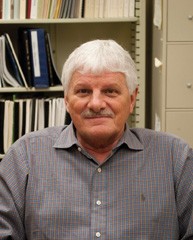A UA researcher who some say was in the middle of his best work passed away last month.
Lynn Joens, a professor of veterinary science and microbiology, died in hospice on Nov. 16 at the age of 65.
Joens was one of several professors in the veterinary sciences and microbiology department, and those who worked with him said he was an especially patient and down-to-earth person.
Alex Armstrong, an assistant researcher within the department who worked with Joens as a doctoral student starting in 2006, said Joens was particularly committed to working with graduate students. Working with students who weren’t familiar with a certain area of research wasn’t always easy, Armstrong said, but Joens was always willing to help people learn something new.
“He was willing to put in that extra time and that extra effort and to use his expertise to really help people come up to having very little knowledge in the field to being fairly expert,” Armstrong said, “which is not something that everyone wants to devote their time to.”
Joens’ most recent research involved developing a vaccine to decrease campylobacter, a bacteria in poultry that causes diseases through human consumption. At the time of his death, Joens had been in the process of finalizing a $2.5 million grant from the USDA for the research, as well as a number of patents, said Maria Parham, Joens’ girlfriend of slightly less than a year.
“He was at the top of his game,” Parham said. “That was the biggest grant he’d ever gotten in all of these years of research, and here he was, ready to do something huge.”
Parham added that Joens’ drive behind his research was the knowledge that it would help people in some way.
According to Mitch Halter, a local non-practicing physician who worked under Joens from 1985 to 1991 as a doctoral student, Joens had been diagnosed with Creutzfeldt-Jakob disease, commonly known as the human version of mad cow disease. A biopsy will determine how the disease was transmitted in a few months or less, Halter said, adding that he found it ironic that Joens had been studying infectious diseases when he died of one himself.
Halter added that Joens enjoyed his research more than anything else.
“He was a great academician, a great scientist,” Halter said, “and if there was anything else he could’ve done, he wouldn’t have done it because that really was his love of life.”
Armstrong said that researchers within the department aim to continue down the path of Joens’ research with the intention of finishing what he started.
“The research that he’s already put forward will continue without him,” Armstrong said. “We’re very committed to making sure that the ideas that he’s already put forward are realized to whatever extent they can be, but obviously we’re losing a dear friend and colleague, and there will never be anyone quite like him again.”









